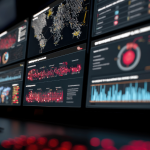Artificial Intelligence is no longer experimental — it’s business-critical. From HR systems screening job candidates to AI copilots drafting financial reports, organizations in 2025 are embedding machine intelligence into the heart of their operations. But with this rapid adoption comes a pressing question: how do we govern the machines making business decisions?
Why AI Governance Matters
AI promises speed, accuracy, and efficiency. But without proper governance, it also introduces significant risks:
- ⚠️ Bias and Fairness: Algorithms can unintentionally perpetuate discrimination.
- 🔐 Data Privacy: AI systems often process sensitive personal and corporate information.
- 🛑 Accountability: When an AI makes a mistake, who is responsible?
According to MIT Technology Review, organizations that fail to implement AI oversight frameworks risk reputational damage, regulatory scrutiny, and loss of stakeholder trust. The World Economic Forum further warns that AI without governance could erode public confidence in technology itself.
Building Frameworks for AI Oversight
Forward-thinking organizations are tackling the AI governance dilemma by adopting structured frameworks that mirror traditional corporate governance:
- Ethics Boards: Cross-functional teams review AI projects for fairness and societal impact.
- Audit Trails: Transparent documentation of how models are trained, tested, and updated.
- Risk Classification: Assigning “risk levels” to AI tools based on their business-critical role.
- Continuous Monitoring: Ensuring AI decisions remain reliable and unbiased over time.
These frameworks don’t just reduce risks — they also increase trust among employees, customers, and regulators.
The Regulatory Push
Governments worldwide are also moving fast. The EU’s AI Act and similar frameworks in the U.S. and Asia are setting global precedents for responsible AI. Organizations that delay implementing governance will soon find compliance is not optional but mandatory.
Where Governancepedia Fits In
At Governancepedia, we break down AI oversight frameworks in clear, accessible ways. Our mission is to give leaders the knowledge and tools they need to manage AI risks — from ethical dilemmas to regulatory requirements. By connecting insights from global experts with practical governance models, Governancepedia helps organizations build trust in the age of automation.
✨ The Bottom Line: AI is rewriting the rules of business, but it cannot govern itself. In 2025, the organizations that succeed will be those that embrace AI governance — balancing innovation with accountability, speed with ethics, and automation with oversight. At Governancepedia, we’re here to guide the way.



